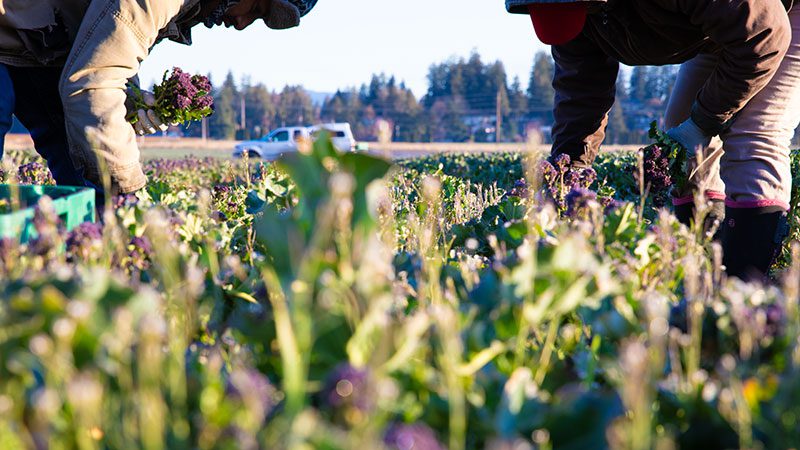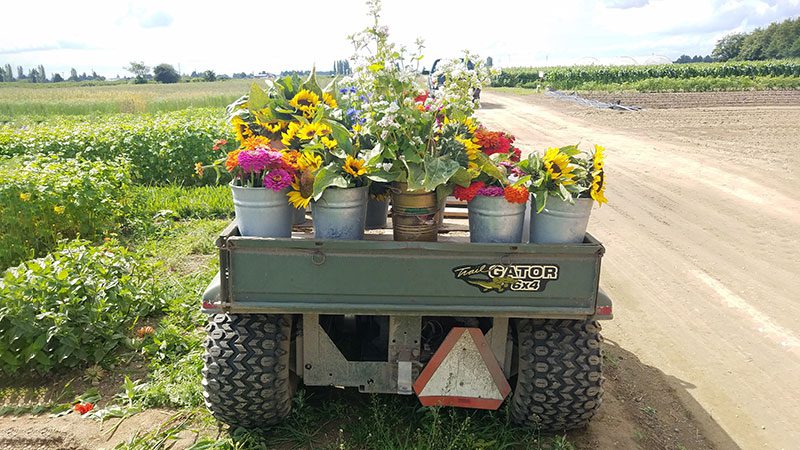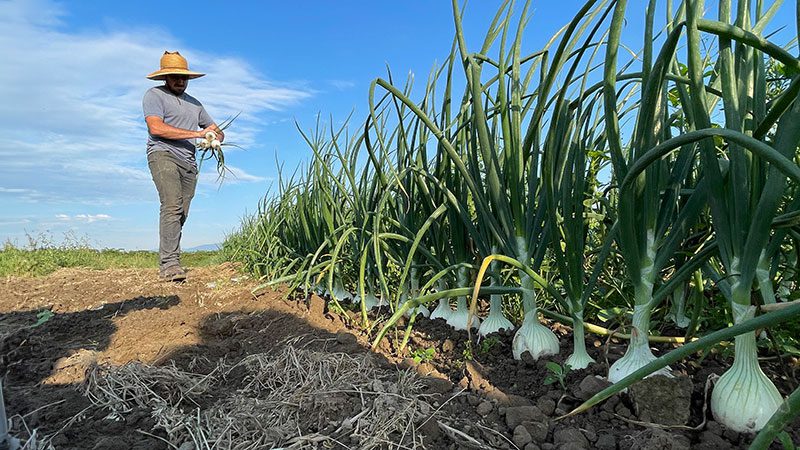Viva Farms Expands
Grant supports new farmers in King County
By Rebekah Denn
This article was originally published in March 2024

On a half-acre plot of land in Woodinville, Noa Kay and Mark Albonizio grow Romano beans and leafy greens and dozens of other vegetables and herbs.
“Small-scale, ecologically friendly” farming at their Songbird Haven Farm is a second career for the couple, one they learned through Viva Farms. Viva has provided bilingual training programs and access to land, equipment and mentors to beginning and historically underserved farmers since it was founded in Skagit County 15 years ago. In its core offering, farmers go through an 8-month training program and work on Viva’s student farm; graduates interested in starting their own businesses can start with a small plot on the shared organic acreage. Viva’s “agriculture park” provides larger plots and longer leases, helping farmers scale up their businesses before moving offsite. Through that practicum and other workshops and opportunities, Viva has educated more than 1000 beginning farmers in sustainable, organic practices.
In 2019, the nonprofit began a small expansion to King County, adding a 10-acre Woodinville site on top of its 109 acres in Skagit. That Woodinville farmland is now full. Farmers like Songbird’s who are ready to move on to their own properties are struggling to find affordable, available land, meaning space isn’t free at the King County “incubator” for new Viva graduates to continue the cycle.
That’s why a new $3 million grant from King County could be a game-changer – for Viva, for farmers and for people seeking fresh local food. Viva has two years to use the Conservation Futures funding to purchase more property in King County, preserving badly needed farmland while giving aspiring local farmers a path to success. (PCC’s spring fundraiser supports Viva programs; see below for how to help.)
The King County bottleneck is “kind of a good problem, because we’ve reached a point where we’re doing good enough work where people see the opportunity in farming and want to do it,” said Michael Frazier, Viva’s executive director. “The problem is, we can’t support everybody who wants to do it at this point. So that land expansion continues to be important.”
Until now, “we’ve had just enough people launching off site to bring in people that wanted to come in and expand. This is the first year we’ve had to tell people that were otherwise qualified ‘Sorry, you can’t (continue) with us.”
Viva’s farming plans
Viva’s ultimate hope is to develop an 100-acre agricultural park in King County, similar to its Skagit property. Around 15 farms could use that land each year, tending 5 to 25 acres each and gaining experience for their fledgling businesses before graduating to more permanent farms elsewhere.
Farms of that size “can be the source of primary income providing a living wage, and feeding thousands of community members with fresh, healthy and local food,” Viva wrote in its successful grant application. Providing that land creates a rare viable path for small, working-class independent farmers to enter a system that’s becoming rapidly consolidated into corporate-owned farming giants. Between 2012 and 2017 alone, Viva wrote in its application, the number of small and midsized farms in the country declined by nearly 19%. (It’s dropped even more steeply since, according to recently released data from the 2022 Census of Agriculture.) At the same time, the top 4% of U.S. farms sold more than two thirds of all agricultural products in the U.S.
It’s just one aspect of Viva’s commitment to preserving and expanding farmland in the region, and its support for an unusually diverse group of students. Across the U.S., 95% of farmers are white and 64% are male. Among Viva participants, 47% are Black, Indigenous and People of Color (BIPOC) or Latino, while 48% are female or nonbinary. The Skagit program in particular reached out to farmworkers – 78% of farmworkers nationwide are Latino, by some estimates – and has seen many go through the 8-month hands-on program learning the business and working on Viva’s student farm, then progressing to their own businesses through Viva’s incubator. (You may recognize some of their many graduates from farmers markets and CSAs, such as Regino Farms and Boldly Grown.)
Frazier noted that Viva already has a strong track record through its ongoing work in Skagit – ephemeral as well as practical.
“We historically have talked about the essentials that we provide for folks that come to the program, and it’s training, land, infrastructure, equipment, markets and capital. And I could argue the very most important thing that we offer is community… it’s a very, very diverse community of people that would oftentimes never rub elbows otherwise, and it’s part of the beauty of our work.”
The $3 million grant wouldn’t meet all Viva’s needs in King County – but it would help enormously and would also solve one major roadblock: Having cash available when buyers are ready to sell. Federal programs intended to help new or underserved farmers generally don’t work at the speed or logistics required in this red-hot region. Some programs are Catch-22s, requiring a signed purchase agreement to access grants, with no way to reach that agreement without the grant money in hand.

No room to grow
All those issues affect Songbird Haven’s no-till farm.
Kay and Albonizio began farming on a quarter-acre at Viva in Woodinville then expanded to the current half-acre. It’s successful, supporting a CSA and food access partners and other outlets, but a plot that small can’t generate enough income for the couple to leave their public health jobs and farm full-time. Working on temporary leased land also means they’re unlikely to install infrastructure or plant perennials or make other permanent investments like the hedgerows they’d love to grow to block wind, improve soil moisture and create an eco-friendly habitat.
“We never want to be huge, but we do want to grow to two or three acres,” Kay said.
“We’re feeling ready. We’ve gotten such great practice and proof of concept on our business model… but we’re ready for the next thing.”
They’re searching for land in a 90-minute radius of Seattle, a tough quest.
“We’re competing now with people with second homes, people with tech jobs who can work remotely, people who have horses. And all of that is fine, but it’s really hard for farmers to get into the mix.”
A Viva agricultural park in King County wouldn’t solve every issue they face, but at least would buy them more space in the short term and more time to search.
Vanishing farmland
Vanishing farmland is an issue of national as well as regional importance; the average age of U.S. farmers is 58. Many farmers are retiring with no successors in sight and land that would bring far more money if sold for development rather than growing vegetables. It’s a particularly pressing problem in the Puget Sound region, where skyrocketing land prices and housing developments have been swallowing up farmland for decades. (The crisis led to the founding of the PCC Farmland Trust in 1999, now thriving as the statewide Washington Farmland Trust.) Affordable farmland was the top challenge facing young farmers in a 2022 survey by the National Young Farmers Coalition, with available farmland following close behind. The challenge was even greater for BIPOC farmers responding to the survey.
Even as interest in locally produced food grows, and awareness of the importance of maintaining regional food production, more and more county land is lost or sold at prices that, as Frazier put it, “couldn’t make any sense whatsoever to a farmer.”
Conservation Futures funds have helped protect more than 100,000 acres of open space in King County since 1982, according to the county, including well-known areas such as Cougar Mountain Regional Wildland Park and the Capehart Forest restoration in Discovery Park. The grants are funded by a property tax first authorized by the state legislature in 1971; King County is one of 14 participating counties statewide. In 2022, voters approved a proposal to increase the tax with the plan of preserving an additional 65,000 acres over 30 years.
The farmers are waiting.
“There’s so much demand in King County,” said Micah Anderson, farm and education manager at Viva’s King County site. The cohort was meant to be 18 people a few years ago, but Viva wound up running two because they had so many applicants. “You’ve got young people who are getting interested in food systems and knowing where their food comes from. We’ve got immigrants interested in growing socially relevant foods for their communities. We’ve got second-career people who… want to get back to something that feeds their soul and community.”
Kay, among that final group, noted that she and Albonizio already entered farming with advantages others don’t have – they’re in their 40s, with years of work and savings behind them. It’s hard to imagine people in their 20s having the resources to buy land – and that feels “not right,” she said.
“It’s crazy that farmland is being lost to development. We’ve got to do something differently if we want to have good soil to grow food in, and that just seems like a no-brainer to me.”

SUPPORT Viva Farms
PCC’s spring fundraiser from March 27 to April 9 will benefit Viva Farms. Donate at the register at every PCC store or online here.
Meet representatives from Viva Farms from 4 p.m. to 7 p.m. March 28 at the Bothell PCC, from 2 p.m. to 5 p.m. March 31 at the View Ridge PCC and from noon to 3 p.m. April 7 at the Columbia City PCC. Also, watch PCC stores later this year for a Viva Farms commemorative tote bag.
For more information visit the link below:
Viva Farms